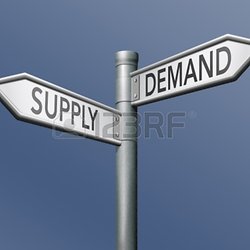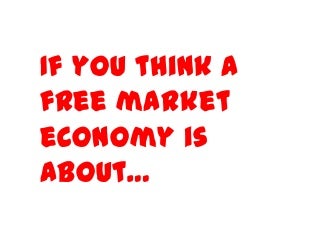 Free market means a market economic system that is primarily based on demand and supply with small scale or also no government control at all. He also sketched the subjectivist, or Austrian, answers to such necessary questions as the nature of strategies of building to profit relationships in a market economic system. In the course of the Fifties and Sixties Lachmann continued to work on Edition: current; Page: 19 two lifelong interests, that is, the function of fixing expectations in the economic system and the speculation of capital. To the contrary, in any real world market scenario whether individual plans diverge or converge is determined by the way in which expectations modify. As noted, the Lachmann-Shackle position that forces of divergence are inclined to outweigh forces of convergence makes a basic market equilibrium unlikely. It is this factor more than some other that precludes anything approaching a macroeconomic basic equilibrium in the uncertain world of market activity. His defense of the market economic system derives largely from a deep concern for the historical growth of Western civilization.
Free market means a market economic system that is primarily based on demand and supply with small scale or also no government control at all. He also sketched the subjectivist, or Austrian, answers to such necessary questions as the nature of strategies of building to profit relationships in a market economic system. In the course of the Fifties and Sixties Lachmann continued to work on Edition: current; Page: 19 two lifelong interests, that is, the function of fixing expectations in the economic system and the speculation of capital. To the contrary, in any real world market scenario whether individual plans diverge or converge is determined by the way in which expectations modify. As noted, the Lachmann-Shackle position that forces of divergence are inclined to outweigh forces of convergence makes a basic market equilibrium unlikely. It is this factor more than some other that precludes anything approaching a macroeconomic basic equilibrium in the uncertain world of market activity. His defense of the market economic system derives largely from a deep concern for the historical growth of Western civilization.
All interference with the entrepreneurial strategy of adjustment and the market’s consequent diffusion of information weakens the forces of equilibrium and impedes fast market clearing. Either piecemeal or planned market intervention inevitably creates dislocations that lead in turn to more intensive market interventions—a spiral that finally cripples the market economic system without providing a satisfactory substitute. In the course of the nineteenth century the market economic system experienced an accelerated growth Edition: current; Page: 21 to the material advantage of the expanding populations of the Western world. During this century, and especially after World Warfare I, both economic principle and economic policy have deteriorated to the point that the survival of the market economic system is threatened.
For the larger part of the 20th century Western society has been sustained by the past accomplishments of the relatively unhampered market economic system of the nineteenth century; nonetheless, such capital consumption can not go on endlessly. Planners profess the flexibility to coordinate economic affairs better than the freely operating market process, which they usually characterize as chaotic” or anarchistic”. Nonetheless, intervention, irrespective of how nicely intentioned, leads to secondary economic dislocations that further hamper the market process and set the stage for more severe maladjustment.
In one kind or another central governments cooperate with the non-public sector in applications to rationalize” or improve upon” the market system by cultivating balanced development” (Cultivated Development and the Market Economic system”). Originally the money supply is increased with the item of artificially reducing market rates of interest to be able to stimulate investment, production, and employment. Equally necessary is that the bogus booms and consequent slumps attributable to the infusion of money into the loan market make the market economic system appear inherently unstable.
The function of government must be as circumscribed as attainable and conform to the classical liberal perfect of supporting the free market by strengthening the institutions of private property and voluntary business contract. Relative prices change every single day for one purpose or another, as an example, adjustments in data that will occur on either side of the market.

